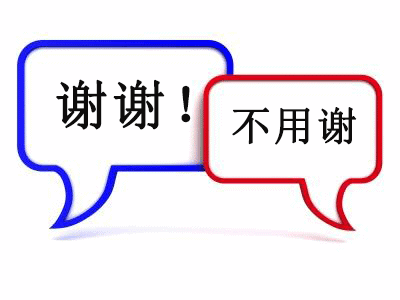The first thing I asked when I arrived in China over 4 years ago was how to say ‘hello’ and ‘thank you’. I insisted on saying ‘谢谢’ for everything and got upset when people didn’t say it back to me when I held a door or did some other trivial deed. I tried to ask several people how to say ‘please’ and although I was taught 请 (qǐng), I never heard it used by the local people.
Please, and thank-yous were drilled into me from a young age and it was really hard for me to accept that in China, it’s just not necessary to say them that often.
I had a taxi driver once who told me that since I was the one giving him the money why was I the one saying thank you? I did see his logic, but I still said thank you to him and gave him a few English lessons.
I even have a Chinese friend who told me that since we were friends, I really didn’t have to say thank you for things. I still say thank you to my close friends for all kinds of things, but it does make you wonder if it’s overkill…
Anyway, over the next 4 years of being in China, I did begin to learn some things about politeness and etiquette in China (I’m still learning, honestly), and it may be different from what I’m used to, but it’s just as important.
Below are 10 Polite Expressions in Chinese that you can use in different situations. To read more about the characters used and to see the pinyin, click on the red-linked character sentences.
1. 麻烦你
麻烦你 (má fan nǐ) sorry to trouble you.
麻烦你 (má fan nǐ) is often used as ‘sorry to trouble you..’ before asking a question or for someone’s help. The literal translation of 麻烦(má fan) is ‘troublesome’ or ‘annoying’ and using this kind of phrase shows respect to the other person.
When using 麻烦你 (má fan nǐ), 我 or ‘I’ does not need to be used.
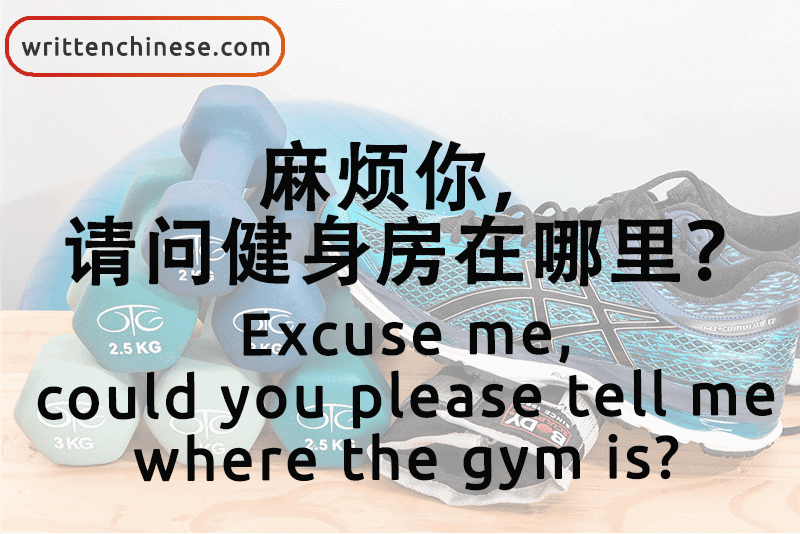
For example
麻烦你, 请问健身房在哪里? (má fan nǐ, qǐng wèn jiàn shēn fáng zài nǎ lǐ?) Excuse me, could you please tell me where the gym is?
麻烦你 (má fan nǐ) also be replaced with 劳驾 (láo jià) meaning ‘excuse me’.
2. 不好意思
不好意思 (bù hǎo yì si) = to feel embarrassed / to find it embarrassing / to be sorry (for inconveniencing somebody)
不好意思 can sometimes be used to apologize for doing something wrong.
For example
不好意思,我迟到了。 (bù hǎo yì si, wǒ chí dào le) I’m sorry I’m so late.
不好意思 (bù hǎo yì si) can also be used instead of 麻烦你 (má fan nǐ), as a kind of ‘excuse me’.
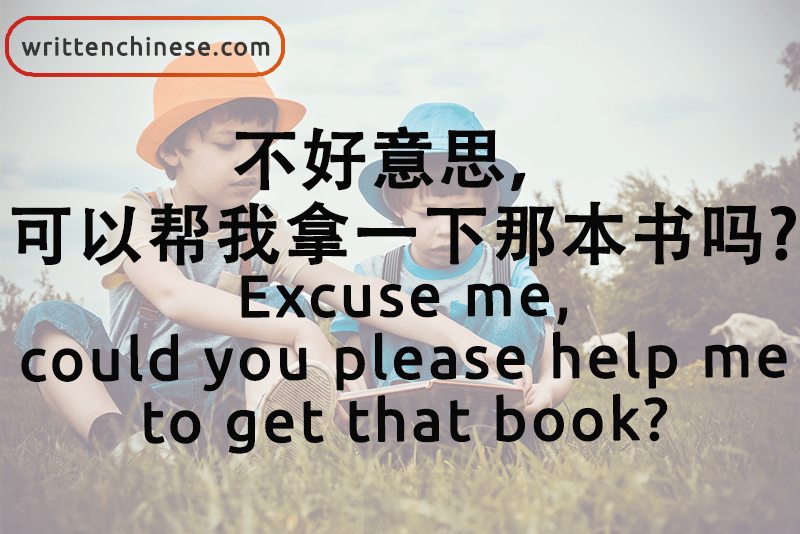
For example
不好意思,可以帮我拿一下那本书吗? ( bù hǎo yì si, kě yǐ bāng wǒ ná yī xià nà běn shū ma?) Excuse me, could you please help me to get that book?
3. 对不起
对不起 (duì bu qǐ) = unworthy/to let down/I’m sorry/excuse me/pardon me/if you please/sorry?
This is a pretty good general word for ‘sorry’. For example, if you were to stand on someone’s foot or knock into them accidentally.
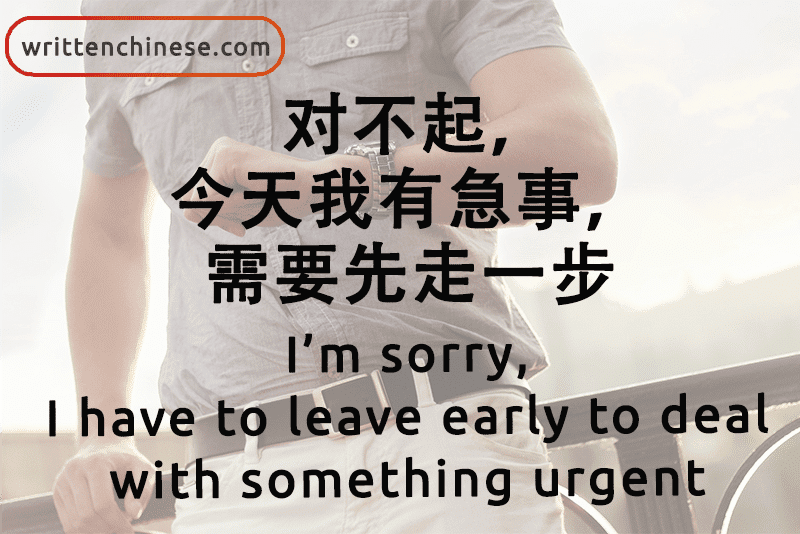
For example
对不起,今天我有急事,需要先走一步。 (duì bu qǐ, jīn tiān wǒ yǒu jí shì, xū yào xiān zǒu yī bù.) I’m sorry, I have to leave early to deal with something urgent.
In the above example, we can also use 不好意思 (bù hǎo yì si) instead of 对不起 (duì bu qǐ) as it is a more gentle way to say sorry.
4. 请问
4a. 请问 (qǐng wèn) Can I ask…?
请问 (qǐng wèn) is a formal way to ask a question, probably like saying ‘excuse me’ or ‘can I ask?’

For example
请问这个附近有药店吗? (qǐng wèn zhè ge fù jìn yǒu yào diàn ma?) Excuse me, is there a pharmacy nearby?
4b. 一下 (yī xià) to give something a try
Now seems a good time to mention 一下 (yī xià) which is used when you wish someone to take a little time to do something. It’s a more casual and a gentler way to suggest something to someone.
一下 is used after a verb.
For example
问一下 (wèn yī xià) means to ask a question.
看一下 (kàn yī xià) means to take a look at something.
打扰你一下 (dǎ rǎo nǐ yī xià) means to bother someone for help.
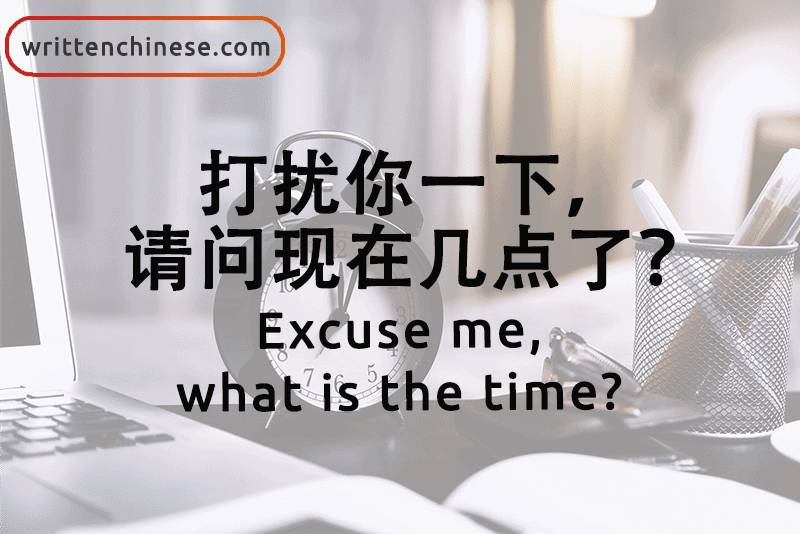
打扰你一下,请问现在几点了? (dǎ rǎo nǐ yī xià, qǐng wèn xiàn zài jǐ diǎn le?) Excuse me, what is the time?
5. 不用谢
不用谢 (bú yòng xiè) You’re welcome / Don’t mention it
不用谢 literally translates to mean ‘no need for thanks’. This is one of the most commonly used responses to ‘谢谢’ (xiè xie) or ‘thank you’. The idea that saying thank you is really not necessary is really emphasized with this phrase, especially when you consider the western reply, ‘you’re welcome’
6. 哪里哪里!
哪里哪里! (nǎ lǐ nǎ lǐ) you’re too kind / you flatter me
A respected and polite quality that a Chinese person should have is modesty. You never accept flattery willingly (by saying 谢谢), but by using 哪里哪里 (nǎ lǐ nǎ lǐ) which means ‘where? where?’ In other words “Where is the person with these qualities, as it cannot possibly be me.”
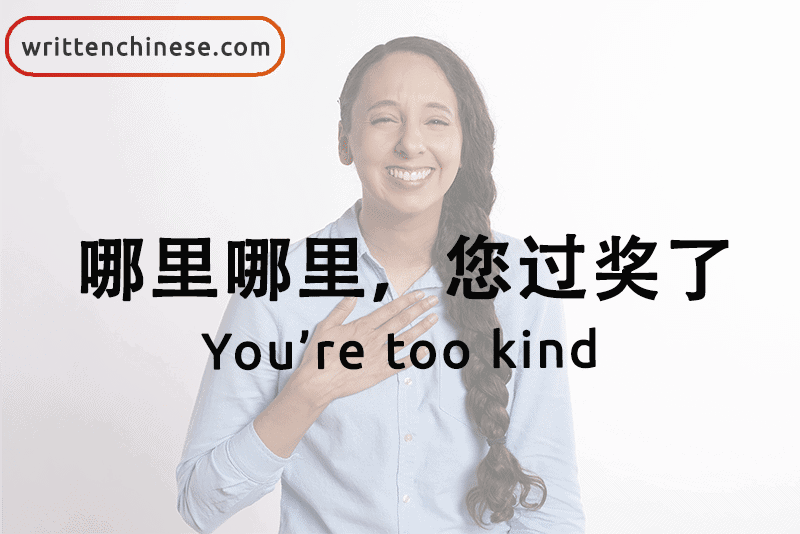
For example:
你的字写得真好看! (nǐ de zì xiě de zhēn hǎo kàn) Your handwriting is beautiful!
哪里哪里,您过奖了。 (nǎ lǐ nǎ lǐ, nín guò jiǎng le) You’re too kind.
7. 没关系
没关系 (méi guān xi) It doesn’t matter
The bigram 关系 (guān xi) is probably best known for its meaning as ‘relationship’, but in this case, it means ‘concern’ or ‘affect’. 没关系 (méi guān xi) translates to something like ‘there’s no concern’ or ‘there’s no effect’.
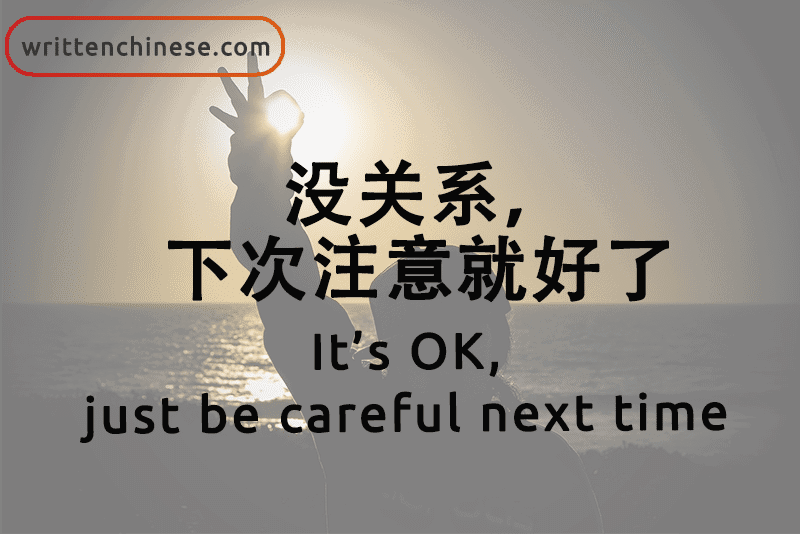
For example
对不起,我迟到了。 (duì bu qǐ, wǒ chí dào le) I’m sorry I’m so late!
没关系,下次注意就好了。 (méi guān xi, xià cì zhù yì jiù hǎo le) It’s OK, just be careful next time.
8. 谢谢你帮我。
谢谢你帮我。 (xiè xie nǐ bāng wǒ) Thank you for your help.
This is a simple, casual phrase to use if a Chinese person gives you some help. If you want to show respect, then you can say 谢谢你的帮助。 (xiè xie nǐ de bāng zhù)
9. 不客气
不客气 (bú kè qi) You’re welcome / Don’t mention it
客气 (kè qi) actually means polite, so although this is often used as an equivalent to ‘you’re welcome’, its actually more like ‘dont be so polite’.
10. 劳驾
劳驾 (láo jià) Excuse me
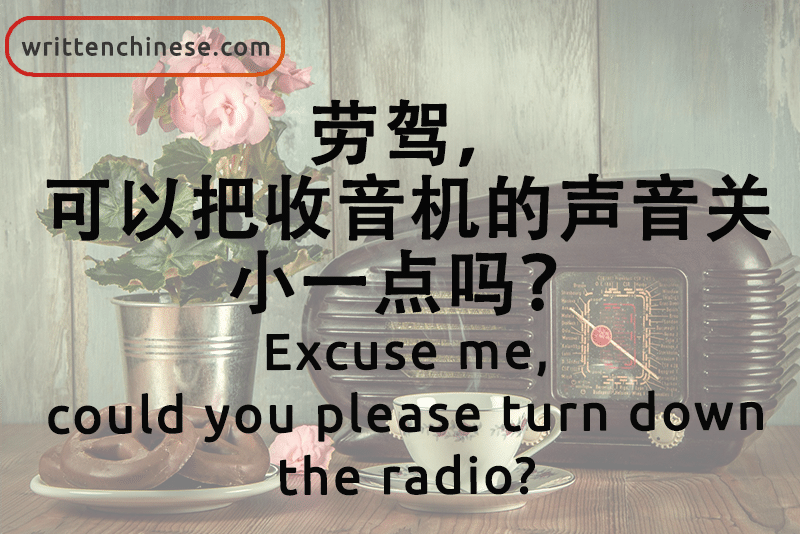
For example
劳驾,可以把收音机的声音关小一点吗? (láo jià kě yǐ bǎ shōu yīn jī de shēng yīn guān xiǎo yī diǎn ma?) Excuse me, could you please turn down the radio?
Situations Where You Might Need to be Polite
1. On the Metro
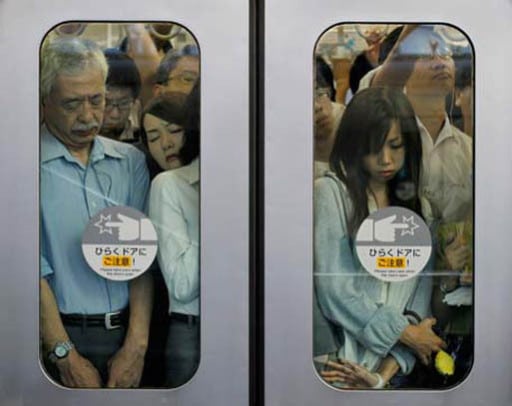
You get onto the metro, and of course, at the stop before yours, 10 people get onto the train and you get trapped amongst movie-watching commuters. You’ve tried hovering ‘politely’ in true western style hoping that someone will notice you need to get passed, and you’ve done the ‘angry’ foreigner thing in the past and barged through a gap to the door.
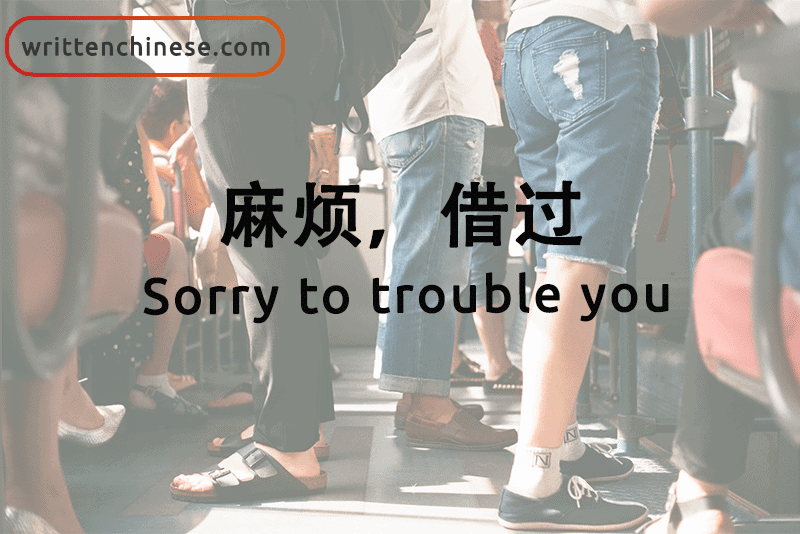
But what’s the polite way to tell someone you need to get passed?
麻烦,借过。 (má fan, jiè guò) Sorry to trouble you.
2. Being Late
You’re late for a meeting and your boss has already started his presentation or you’re late to take an English class. Chinese people are real sticklers for punctuality, so they might ask you why you’re late.
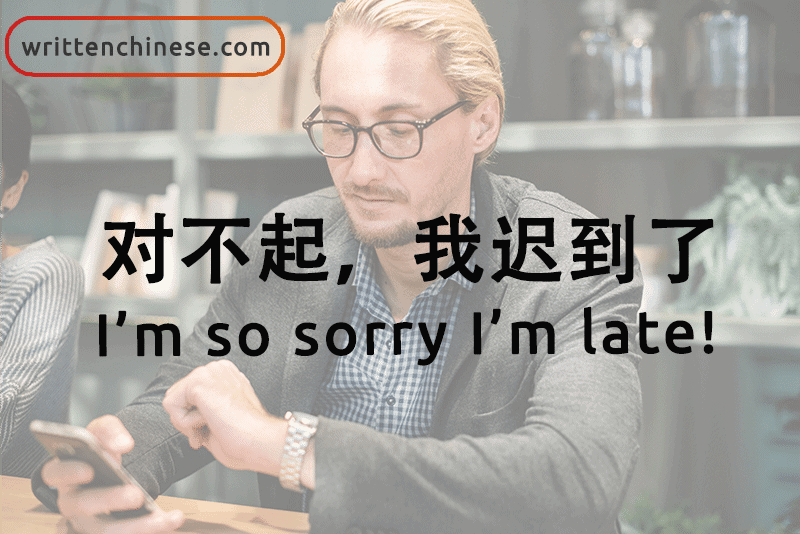
What’s the best way to apologize to your employer for being late?
很抱歉/对不起,我迟到了。 (hěn bào qiàn/duì bu qǐ, wǒ chí dào le) I’m so sorry I’m late!
3. At the Mall
You’ve stumbled upon a great boutique clothing store and as soon as you enter the sales assistant is stalking you around the store hoping to make a sale.
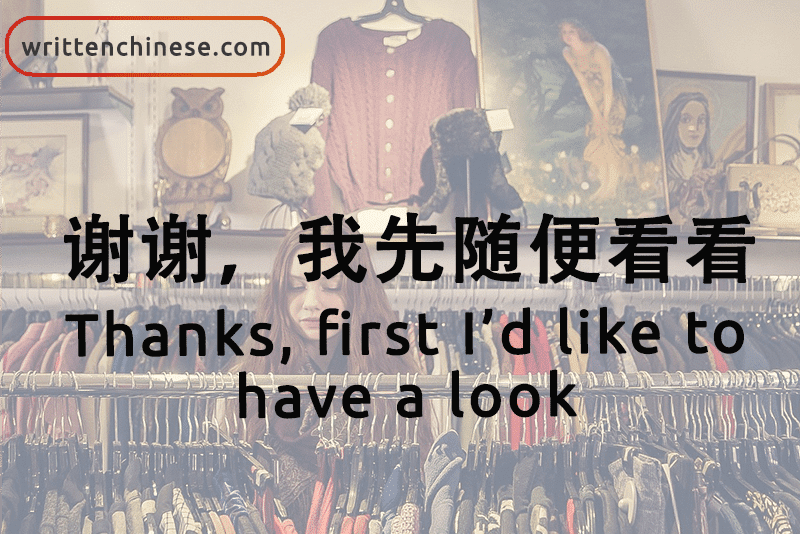
As nice as it is that she wants to help, you don’t really need a shadow, what’s the polite way to tell a sales assistant that you don’t need help right now and that you’ll ask if you need anything?
有什么需要吗?喜欢的话,可以试试。 (yǒu shén me xū yào ma? xǐ huan de huà, kě yǐ shì shì) If there’s anything you like you can try it on.
谢谢,我先随便看看。 (xiè xie, wǒ xiān suí biàn kàn kan.) Thanks, first I would like to have a look.
4. Taking Photos
If you’re in an area of China that has very few foreigners, you might find that you become something of a celebrity being ‘papped’ by photographers. One or two pictures might be OK, but after a while, you might want to politely ask them to stop taking pictures.
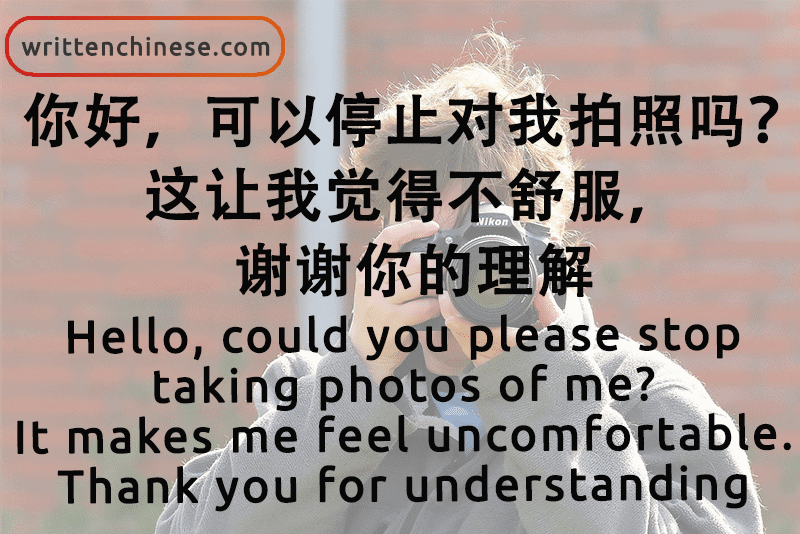
What’s the polite way to ask someone to not take a picture of you?
你好,可以停止对我拍照吗?这让我觉得不舒服,谢谢你的理解。 (nǐ hǎo, kě yǐ tíng zhǐ duì wǒ pāi zhào ma? zhè ràng wǒ jué de bù shū fu, xiè xie nǐ de lǐ jiě.) Hello, could you please stop taking photos of me? It makes me feel uncomfortable. Thank you for understanding.
5. In a Restaurant
You’ve gone to dinner in a nice restaurant, but when the food arrives there’s a problem with your order.
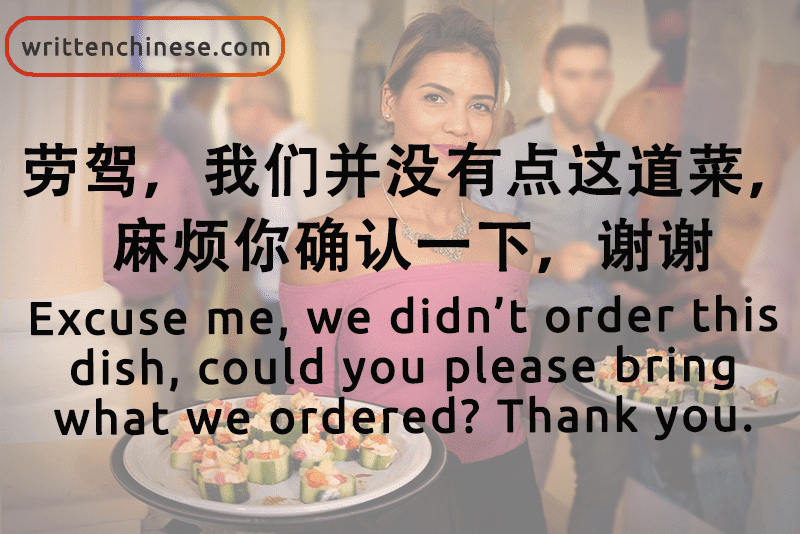
What’s the polite way to tell the waiter they made a mistake?
劳驾,我们并没有点这道菜,麻烦你确认一下,谢谢。 (láo jià, wǒ men bìng méi yǒu diǎn zhè dào cài, má fan nǐ què rèn yī xià, xiè xie.) Excuse me, we did not order this dish, could you please bring what we ordered? Thank you.
These are just a few phrases and expressions you can use to be polite in Chinese. If you have any questions about being polite in spoken Chinese or in Chinese culture please leave us a comment below!
